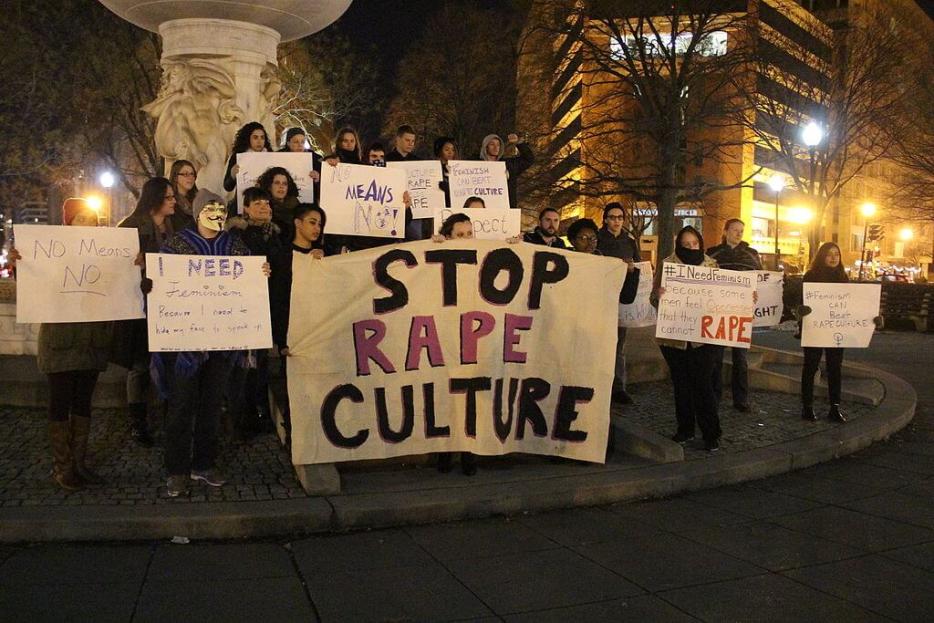What was important to us in 2016? Hazlitt’s writers reflect on the year’s issues, big and small.
Last winter, for each of the eight days of the Jian Ghomeshi trial, Marsha McLeod went to the Old City Hall Building and sat in the media overflow room to watch the case unfold on a TV screen. McLeod, an anti-violence activist and researcher, knew many survivors of sexual violence who tried to avoid the incessant news about the trial. She is a survivor as well, but her instinct was different. “I wanted some time to process what was going on,” she told me. “I found it very affecting. It was clear that the complainants were being made to feel stupid.”
Ghomeshi’s was not the only trial in the past year that exposed deep flaws in the way the criminal justice system treats survivors of sexual violence. Mandi Gray, a York University PhD student who was raped by a colleague, Mustafa Ururyar, was brutally cross-examined when she testified in Ururyar’s trial. Defense council accused Gray of using the attack to gain attention, and argued that she must have been bad in bed; the questioning was so extreme that the judge used his decision to repudiate the defense council’s reliance on stereotypes about rape survivors. This year also saw the release of a transcript from a 2014 case in Alberta in which a provincial judge, Robin Camp, questioned a rape survivor in open court about why she wasn’t able to prevent her attacker from assaulting her, asking, at one point, “why couldn’t you just keep your knees together?”
But for a lot of people, Ghomeshi’s case was the one that hit hardest. In November 2014, he had been charged with four counts of sexual assault and one count of overcoming resistance by choking. Through early February, the country collectively watched him stand trial: reporters live-tweeted the whole thing, so that in the midst of brushing your teeth, say, you could also take out your phone and scroll through a complainant’s testimony about her assault. But it wasn’t just the ubiquity of these updates that made the case loom large; it was the way the flood of information allowed many people to see the unvarnished reality of a sexual assault trial for the first time. The case was a minute-by-minute survey of all the ways the traditional adversarial trial can fail survivors.
When Ghomeshi was acquitted, in March, McLeod was very upset. “But when I thought about it, I realized that I was upset about the process, perhaps more than the verdict itself,” she said. She wasn’t alone: the aftermath of the trial felt like a consciousness-raising moment for a huge swath of Canadian women who had previously been inclined to have faith in the courts. “At dinner parties, on the train, everywhere, people were having this conversation differently than before,” said Pamela Cross, a lawyer who works with survivors of sexual assault. The question is whether those conversations will shift the landscape. What was it all for?
*
Discussions about the need for a better approach to cases of sexual violence are obviously not new. Indigenous women, who have long known that the court system cares little about bringing them justice, “have been trying to raise awareness about this for a very long time,” said Heather Cameron, of the Ontario Native Women’s Association. So have many other women’s advocates. University of Ottawa professor Elizabeth Sheehy, an expert in women and the law, watched the case “with horror, but not surprise.”
The courts’ repeated mishandling of sexual assault cases, she said, has a lot to do with the fact that they haven’t kept pace with our evolving understanding of how trauma affects a crime victim’s memory and behaviour. There’s a need for Canada’s higher courts to set strong precedents about which defense tactics are legitimate. If higher courts would “clarify what kind of evidence is irrelevant,” Sheehy said, they would discourage certain lines of questioning that are based on incorrect assumptions about how a survivor of assault should act. There could also be new legislation: “for example, reforms to the Evidence Act that put limits on the cross-examination of a complainant’s post-offense behavior.” In the short term, Sheehy said, “it may simply be that Crown prosecutors need to introduce expert evidence about the effects of trauma every time, over and over. Because basically what we have to do is replace common sense knowledge—which is actually ignorance—with information.”
"For some women this is the impact of the Ghomeshi case: it has given them a strange new kind of power."
Cross, who educates judges and lawyers about violence against women, agrees that the courts need to have a much clearer understanding of trauma. “My biggest wish is for law schools to step up to the plate,” Cross said, “so that by the time someone graduates from law school, they have at least a basic level of awareness about the impact of violence against women.” The judge in the Ghomeshi case, William Horkins, seemed to go “out of his way to say negative things about the complainants,” Cross said. “A lot of those comments fell squarely in the area of rape myth. They displayed a lack of understanding of sexual assault. That’s why judges need to be taught to understand trauma better: so that a complainant’s evidence will also be understood better.”
But there are also those who wonder whether attempts to fix the criminal justice system’s handling of sexual assault are just stopgaps. “Since the trial, there have been conversations about expanding legal advice for survivors [of sexual violence]. Some advocates talked about calling for Philadelphia Model, which would mean opening up sexual assault cases to feminist organizations for review,” said McLeod. “These things are interesting, but ultimately, all reform is imperfect.”
*
A few months after his first acquittal, Ghomeshi was supposed to go to trial a second time, on one more count of sexual assault. But last May, the complainant in the case, Kathryn Borel, chose to settle the allegations with a peace bond. “It seemed like the clearest path to the truth,” Borel said, in a statement outside the courthouse. “A trial would have maintained his lie, the lie that he was not guilty, and it would have further subjected me to the very same pattern of abuse.”
Both McLeod and Cross found that Borel’s choice resonated. Settling on her own terms “might have felt like an opportunity to be empowered by a process that otherwise would probably have been extremely disempowering to her,” Cross said. “She was able to have a voice and a hand in shaping the outcome. For some women this is the impact of the Ghomeshi case: it has given them a strange new kind of power. They think, Okay, the courts aren’t going to be helpful to me, so I’m going to figure this out outside the system.”
Jillian Rogin, a criminal defense attorney, also understood the motivation for Borel’s impulse to settle the case before going to trial. The common defense tactic of casting doubt on a complainant’s credibility “is inherently violent,” said Rogin. “Survivors, for a variety of reasons, might not be ready to tell the whole story right away. It doesn’t mean they're not telling the truth.” But it does present serious questions about what place the criminal justice system should have in adjudicating allegations of sexual violence.
“I have to disagree with the commentary that we should believe survivors of violence, no matter what,” Rogin said. “To say that women never lie is condescending. Women have agency. We should believe women, of course—but not in the courtroom. If you want to believe women, you have to think of a completely different judicial system. Because we know, for example, that survivors of trauma are not always able to relay information in a consistent manner.”
Rogin would like the post-Ghomeshi conversation to be more expansive, and to explore ideas that are outside of the traditional legal framework. “Ultimately, what is going to produce justice for women?” she asked. “The reason the criminal justice system doesn't work is that when someone's acquitted, there's not only no acknowledgement of the crime, but the complainant is told they were lying. I can't imagine anything more traumatizing for a survivor of sexual violence. Because I think that's one of the first things you ask [after an assault]: Did this really happen?”
Rogin wonders what might be possible if the threat of prison were off the table. “I think prison completely prevents men from being forthright about what happened. I know everything I'm about to say is fraught—in the past, mediation was used to pat women on the head and tell them to move on. But what would it look like to have a discussion in which survivors were asked, What do you actually want out of this process? That’s the conversation I want to start having.”
McLeod agrees. With a research partner, she has been interviewing survivors of sexual violence about how they would ideally like to experience justice. They’ve heard responses of all kinds, from those who feel they need to have their voices recognized by a criminal court, to those who say the last thing they want to see is a perpetrator incarcerated. “As a society we’ve been taught that justice is someone being sentenced in a courtroom,” said McLeod. “But ideas about justice are so individual.” At the end of the day, she says, survivors of sexual violence benefit from understanding what their options are, and what each could entail.
During the Ghomeshi trial, McLeod was not the only survivor to watch from the media overflow room. Still more gathered each day outside the Old City Hall Building while the trial was in session. If McLeod sees anything to be hopeful about, it’s the way the case galvanized survivors, and opened up nuanced conversations about consent and justice. “Survivors really pushed those discussions forward,” she said. They don’t plan to stop.






